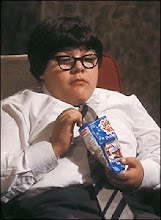 As with the previous two trades, Fear Machine is going to be of most interest to those folks who remember what Britain was like when the book was being written. If you were around at the back end of the 80s then you'll recall that the police were beating the shit out of new age travellers who were doing nothing more threatening than going to festivals, playing the bongos and generally refusing to conform. At the same time, Thatcher and her cronies were pushing through Clause 28 which prohibited the "promotion" of homosexuality, and investigative journalist Duncan Campbell was raising hackles by exposing the existence of a complex surveillance system called ECHELON. Pretty soon Maggie was going to fuck herself by trying to push the Poll Tax through, but at that moment she thought she was invulnerable. It was a depressing time and Fear Machine captures the mood very well.
As with the previous two trades, Fear Machine is going to be of most interest to those folks who remember what Britain was like when the book was being written. If you were around at the back end of the 80s then you'll recall that the police were beating the shit out of new age travellers who were doing nothing more threatening than going to festivals, playing the bongos and generally refusing to conform. At the same time, Thatcher and her cronies were pushing through Clause 28 which prohibited the "promotion" of homosexuality, and investigative journalist Duncan Campbell was raising hackles by exposing the existence of a complex surveillance system called ECHELON. Pretty soon Maggie was going to fuck herself by trying to push the Poll Tax through, but at that moment she thought she was invulnerable. It was a depressing time and Fear Machine captures the mood very well.The good guys in Fear Machine are the travellers and homosexuals, the investigative journalist and the policeman who refuses to give in to corruption. Ranged against them is a shadowy corporation which is seeking to usher in a new age of order through the use of fear and the repression of individuality. There's no doubt whose side Delano is on, or that the corporation represents the repressive right. As their agenda is gradually uncovered, Delano exposes a complex conspiracy involving everyone from government ministers to royalty and the Masons. He's pissed off with the British elite and Fear Machine is his two fingers to them.
Perhaps the message gets in the way of the story. It's a bit loose in the middle and the end feels hurried and rather unsatisfactory. Delano is keen to explore alternative lifestyles, but could have told a tighter tale by spending more time on Constantine and less on the Scottish Pagans whose story takes up much of the second half of the book. His eagerness to explore the dynamics of late '80s Britain is what makes his run on Hellblazer so fascinating, but it does sometimes result in an uneven pace of narrative.
There are also problems with the art in Fear Machine. Mark Buckingham (of Fables fame) handles a lot of it, but this is not the polished Buckingham that we know. The layouts can be confusing, and some of his faces appear oddly distorted. His style and the more photo realistic art of Richard Rayner (who also worked on the book) occasionally jar with each other. All of this lends the art a disconcerting and slightly uneven feel. In some ways that helps create the unsettling mood that Delano is aiming for, but at other times it is slightly distracting.
So, the art isn't brilliant and the story could have done with a good trim, but Fear Machine is an interesting historical piece and as such well worth the effort. It's edgy, uncomfortable horror with a point to make. It's also very British which makes its appearance in an American comic book all the more remarkable. That's true of Delano's entire run. In fact, the more I read of Hellblazer, the more I marvel that it made it past issue 20. You can take it as a straight horror story, but the targets Delano was taking aim at must have seemed very alien to the bulk of the book's American readers. Apparently they enjoyed it well enough though. Fair play to Delano for slipping such a peculiarly political British book under the radar.





No comments:
Post a Comment